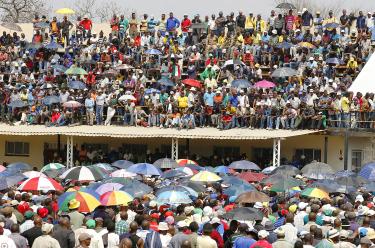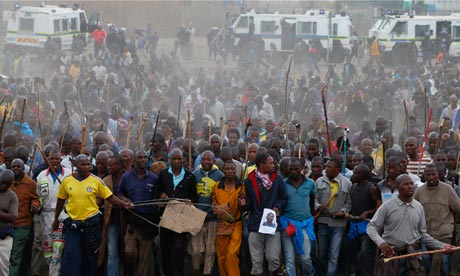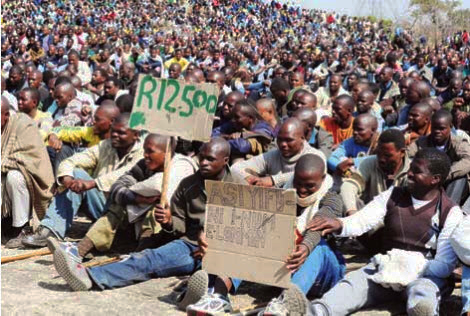workers' rights

Thousands of Amplats mineworkers rally in Rustenburg, South Africa.
By Leonard Gentle
China's 'bureaucratic capitalism'

Photo: Alex Mahan/Flickr.
South Africa: Latest ANC/police attack on militant miners condemned

SACP's Blade Nzimande leads COSATU members prior to clashes with striking Anglo Platinum miners.
Palestine: The Histadrut -- its history and role in occupation, colonisation and apartheid

By the Trade Union Friends of Palestine (Ireland)
October 11, 2012 -- BDS Movement -- Israel's trade union federation, the Histadrut, was founded in December 1920 in British Mandate Palestine. From its inception its aims were neither to build workers' solidarity nor represent or campaign for workers' rights.
Instead it was founded as an exclusively Jewish organisation to facilitate the colonisation of Palestine. As such it worked in tandem with the Jewish Agency to promote the exclusion of Palestinian labour and produce, and was at the forefront of the movement to turn Palestine from an Arab country into a Zionist one.
Today it continues to work hand in hand with th government of Israel and promotes and defends policies that violate the basic civil, political and human rights of Palestinians.
South Africa's political economy after the Marikana massacre

Marikana miners protest against the August 16, 2012, massacre by police.
South Africa: Dying for growth -- World Bank's role in Marikana massacre mine, carbon pollution

More than 3000 mineworkers take part in a march at Lonmin's Marikana mine in South Africa on September 5, 2012. Photograph by Mike Hutchings/REUTERS.
For more on the Marikana mine massacre, click HERE.
By Patrick Bond
September 5, 2012 -- Links International Journal of Socialist Renewal -- “One of the things you learn as an anthropologist, you don’t come in and change the culture”, Dartmouth College president Jim Yong Kim told wealthy alumni when contemplating the institution’s notorious hazing practices, prior to US President Barack Obama’s request last February that he move to the World Bank.
Kim’s Harvard doctorate and medical degree, his founding of the heroic NGO Partners in Health and his directorship of the World Health Organization’s AIDS division make him the best-educated, most humane World Bank president yet. A decade ago, he co-edited the book, Dying for Growth, pointing out that "Washington Consensus" policies and projects had a sharply adverse impact on health.
Thailand: Urgent appeal -- please endorse open letter for the release of Somyot Prueksakasemsuk

[More background information is available here.]
By the Thai Labour Campaign
September 4, 2012 -- Somyot Prueksakasemsuk is to appear again on September 19 to hear the Criminal Court announce the date of the verdict of Somyot's criminal trial. At the same time, it will await the decision of the Constitutional Court on the request forwarded by the Criminal Court of the Constitutional Court’s verdict as to whether or not the lèse majesté law is unconstitutional in response to a petition by him and his lawyers. Somyot, however, speculates that the decision of the Constitution Court will not be delivered on that day and the verdict in on his specific case will be further postponed until the constitutional verdict is reached.
This means that Somyot faces a further and potentially long period in prison.
Hence, we are again calling for your international solidarity to continue sending letters to the Thailand authorities in order that Somyot can be released soon. We need to ensure at least that Somyot be released on bail while he is waiting the verdict.
Act now! Please endorse this open letter to the Thai authoritiess before September 12. Please send the name of your organisation to:
Patchanee Kumnak, program coordinator, Thai Labour Campaign.
Email: patchanee@thailabour.org
South Africa: Marikana massacre – a turning point?

Marikana mineworkers on strike for higher pay.
For more coverage of South Africa, click HERE.
By Martin Legassick
August 27, 2012 – Links International Journal of Socialist Renewal -- The massacre of 34, and almost certainly more, striking mineworkers at Marikana (together with more than 80 injured) on August 16 has sent waves of shock and anger across South Africa, rippling around the world. It could prove a decisive turning point in our country’s post-apartheid history.
Marikana is a town situated in barren veld, dry brown grass in the winter, with occasional rocky outcrops (kopjes, hillocks). The Lonmin-owned mines – there are three, Karee, West and East Platinum – are situated on the outskirts of the town. Alongside two of them is a settlement of zinc-walled shacks festooned with lines of washing called Enkanini, where most of the mineworkers live.
South Africa: 'Sorting fact from fiction at Marikana' -- Terry Bell on the massacre of mineworkers

For more coverage of South Africa, click HERE.
August 27, 2012 -- Terry Bell is a widely respected labour reporter and activist based in Cape Town, South Africa. His "Inside labour" columns in Amandla! magazine and on his blog, Terry Bell Writes, are essential reading for those interested in developments in South Africa's labour movement. Below, with Terry Bell's permission, Links International Journal of Socialist Renewal posts some of his recent columns dealing with Marikana massacre and the background to it.
* * *
By Terry Bell
August 23, 2012 -- Terry Bell Writes -- The deaths at Lonmin amount to the bloodiest tragedy of the post-apartheid era. As a result, the blame game is in full swing and is likely to continue in the weeks ahead.
Aotearoa/New Zealand: Call for international solidarity with Burger King workers

By Joe Carolan
August 24, 2012 -- Links International Journal of Socialist Renewal -- Workers employed by the Burger King fast-food chain, organised by the Unite Union in Aotearoa/New Zealand, are suffering a sustained union-busting campaign, and are now fighting back.
Burger King workers are the lowest-paid fast food workers in Aotearoa/New Zealand. Most are on the minimum wage, even some who have worked there for 15 years. Managers on salary are forced to work extra hours, and sometimes work for less than the minimum wage per hour. Many workers in Burger King are migrant workers, mostly from the Indian subcontinent. They face a bonded labour system. They are terrified of speaking out about mistreatment in case the company revokes their visa sponsorship .
Now the company has tried to bust their union, and is seeking an injunction stopping them from speaking to the media and conducting teach-ins in the community. Unite has taken the company to the Employment Authority, detailing the company's illegal anti-union activities, in a battle that is now shaping up to be the McLibel case of the South Pacific.
Unite union appeals to workers in other countries to organise pickets outside Burger King outlets in all the great cities of the world in solidarity with our fight.
Our fight is for the low-paid precarious workers.
South Africa: The massacre of our illusions … and the seeds of something new
By Leonard Gentle, director of the International Labour Research and Information Gro
